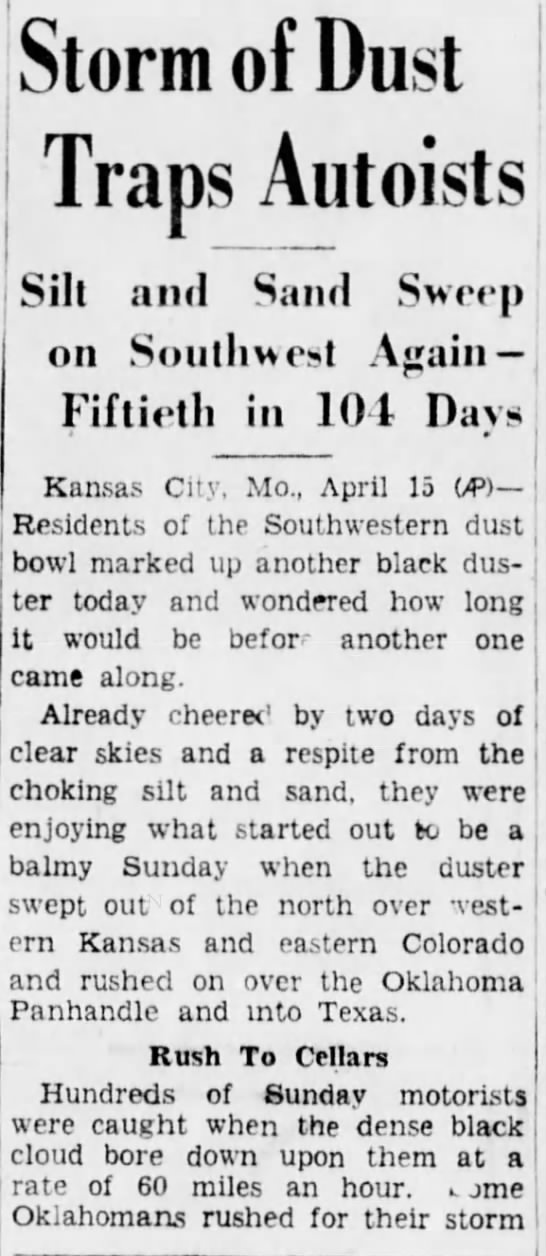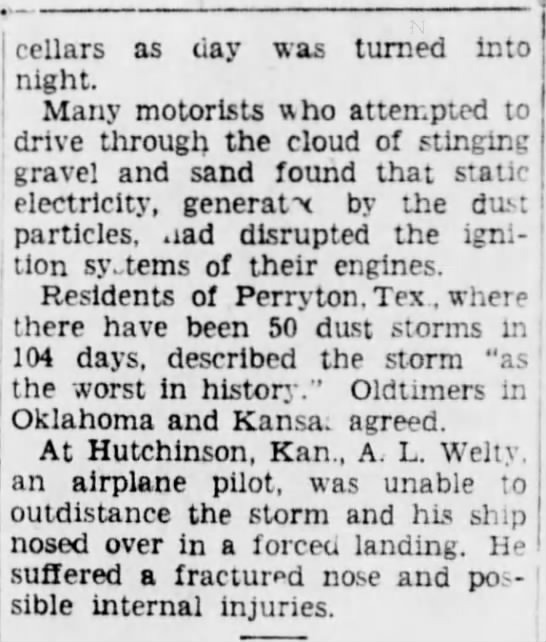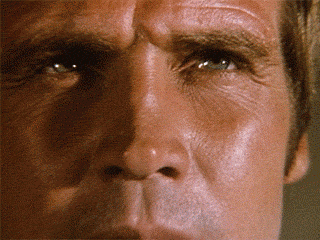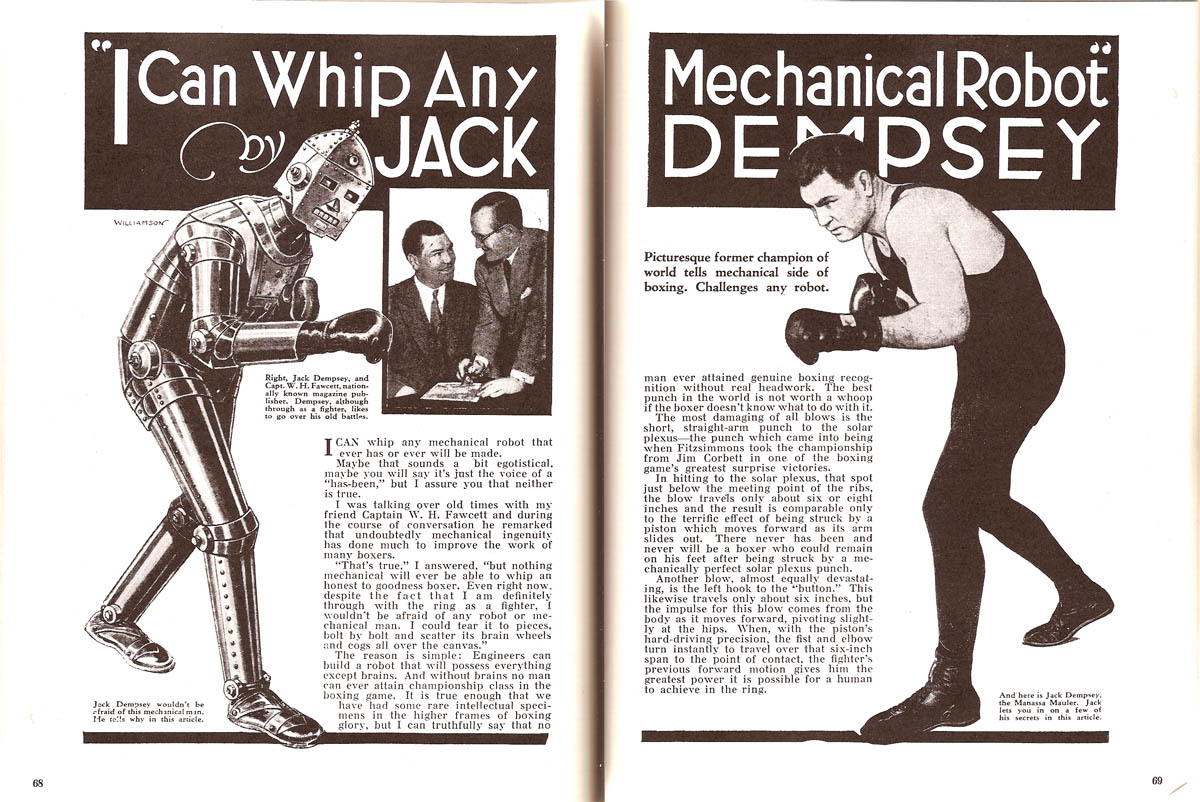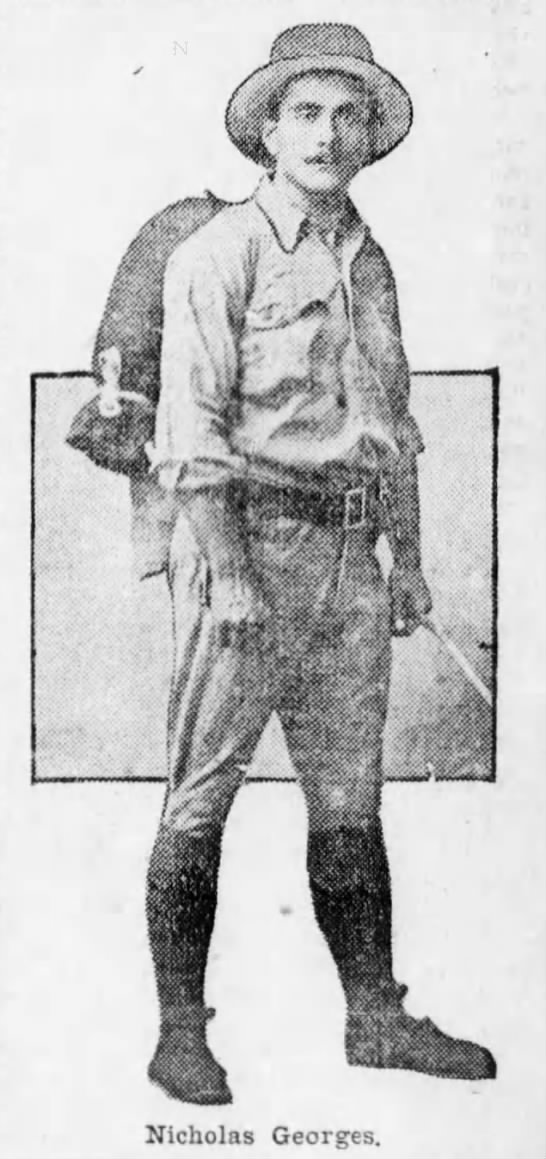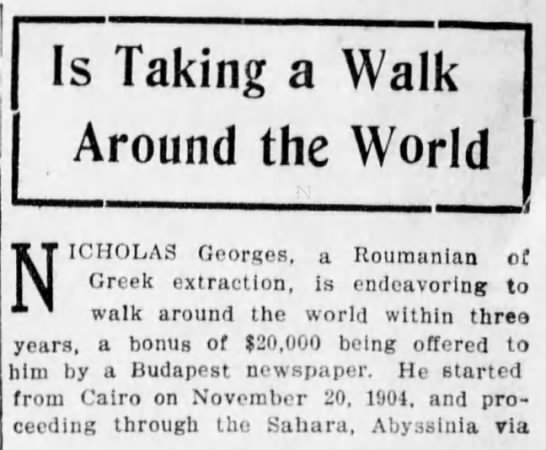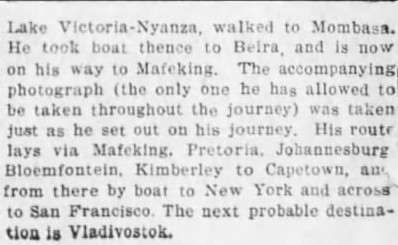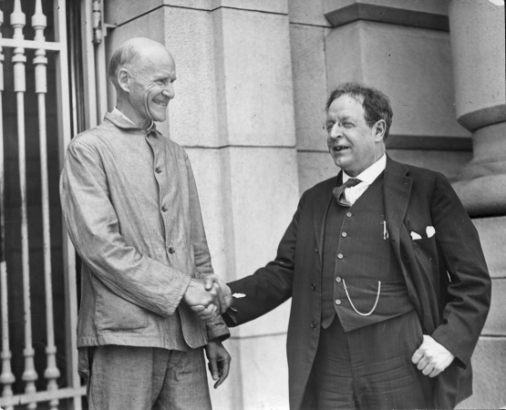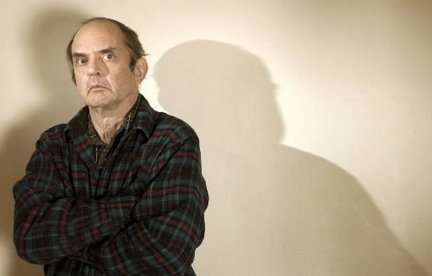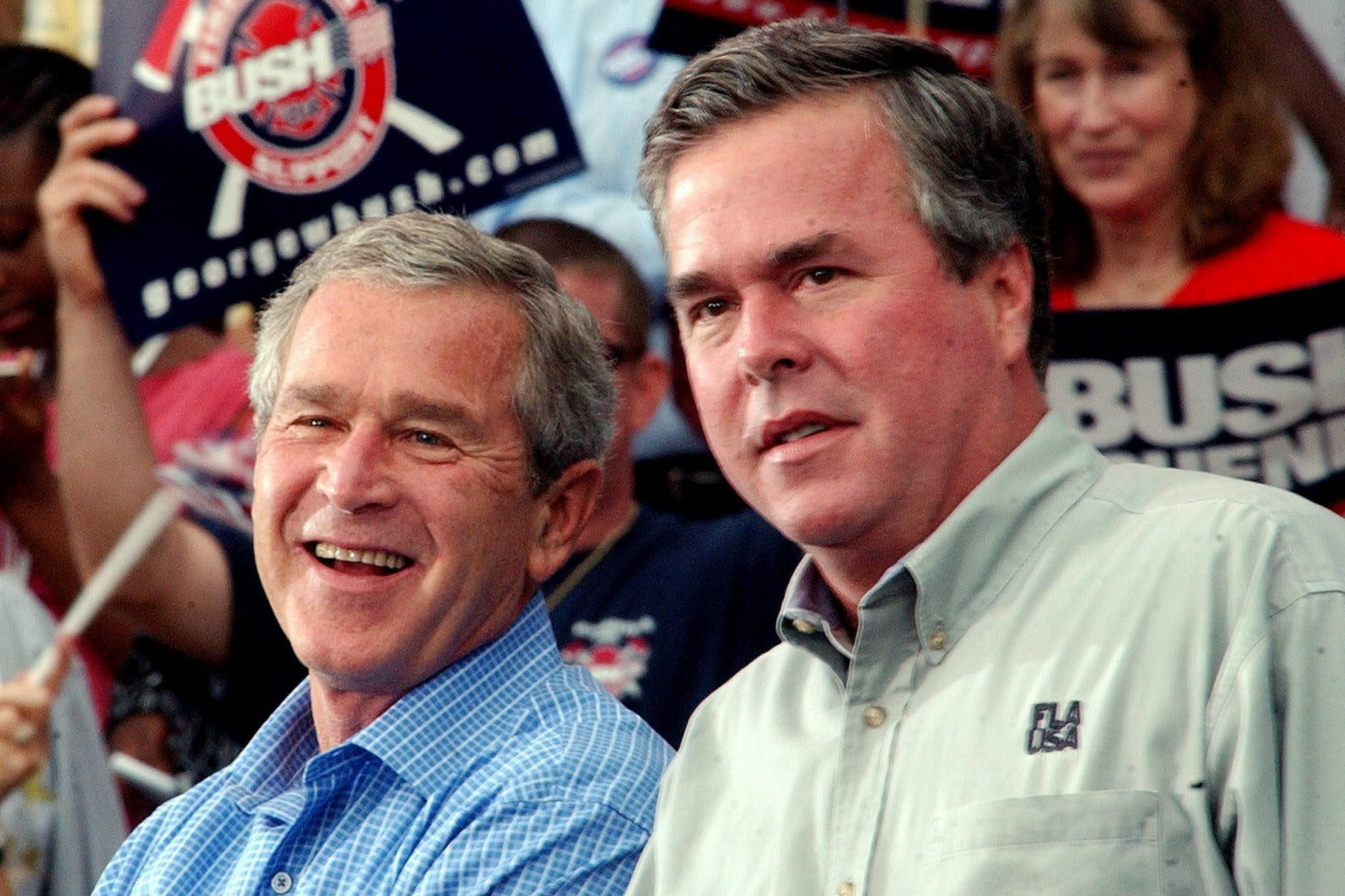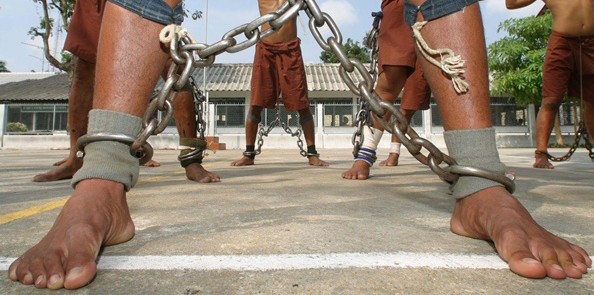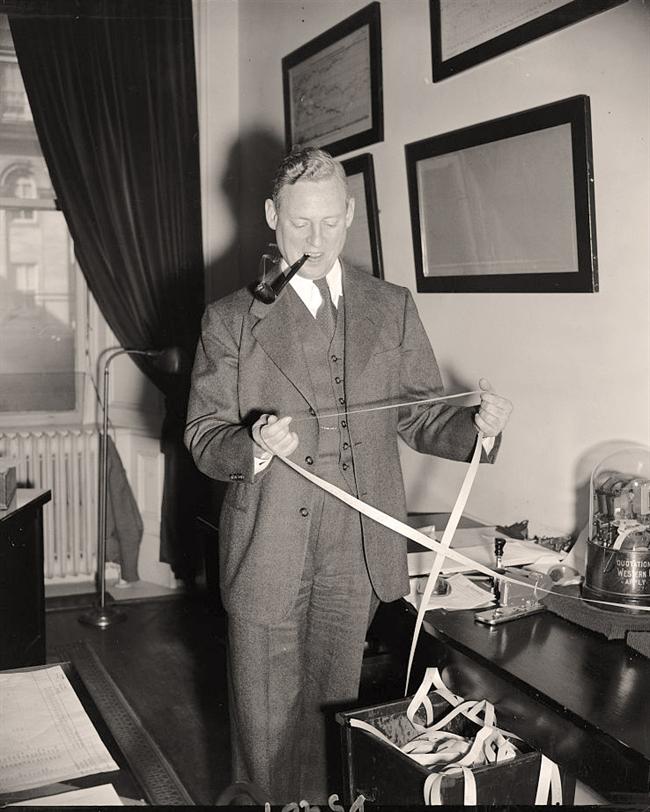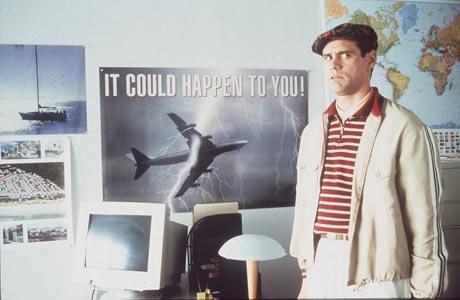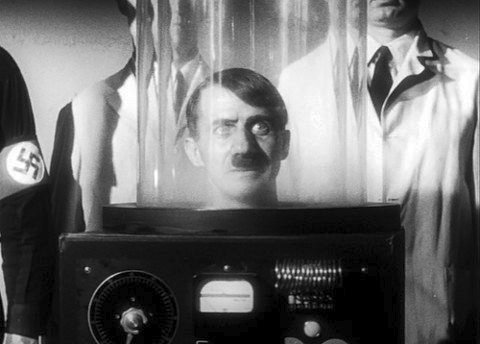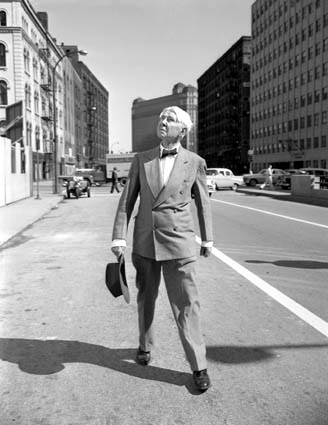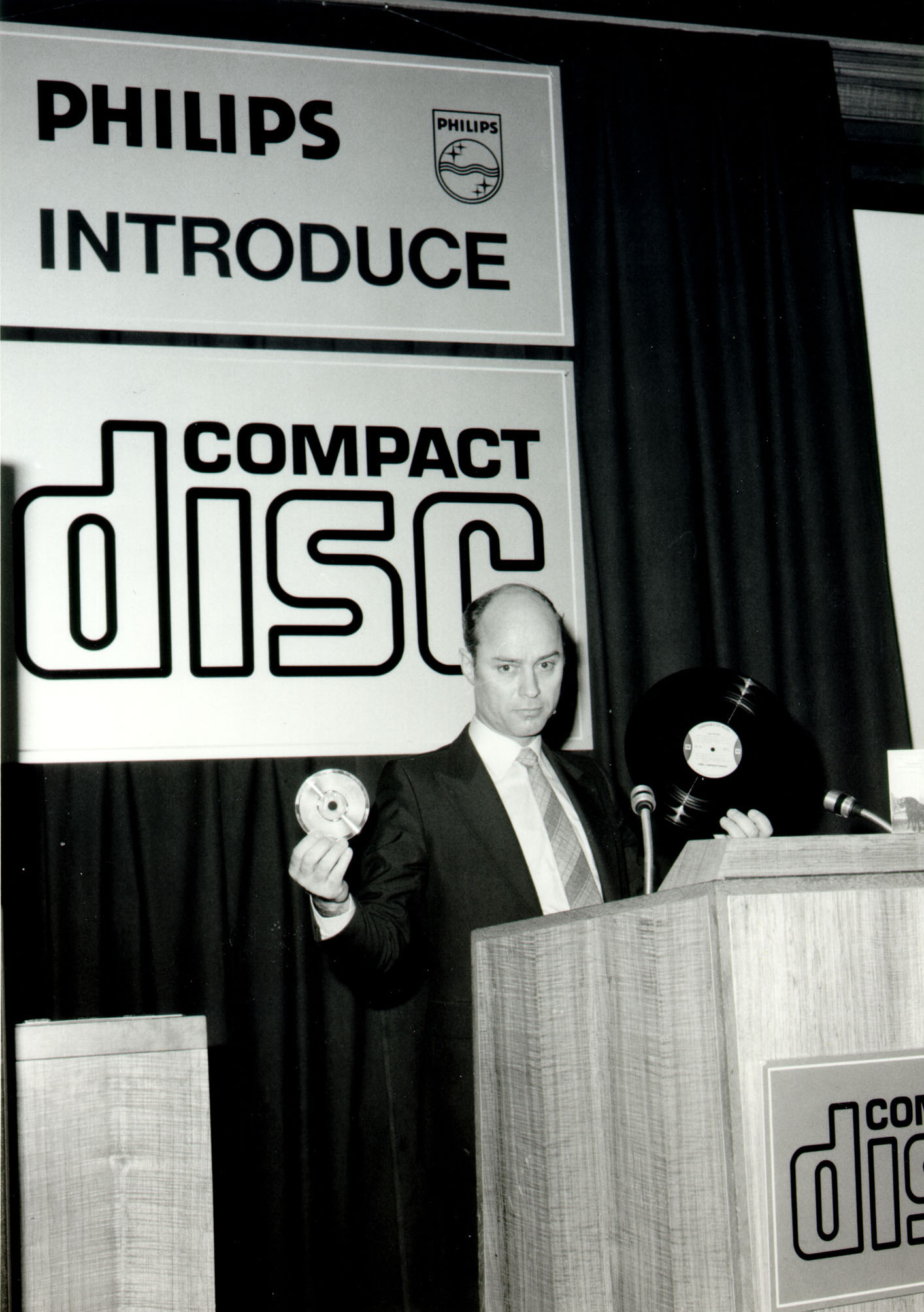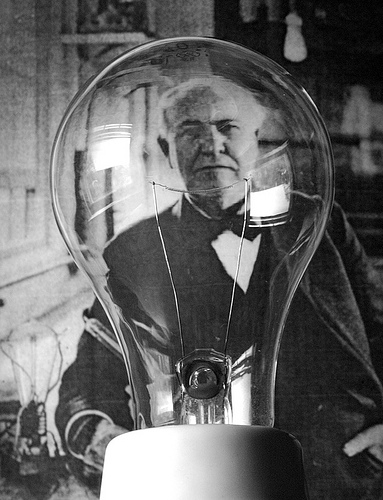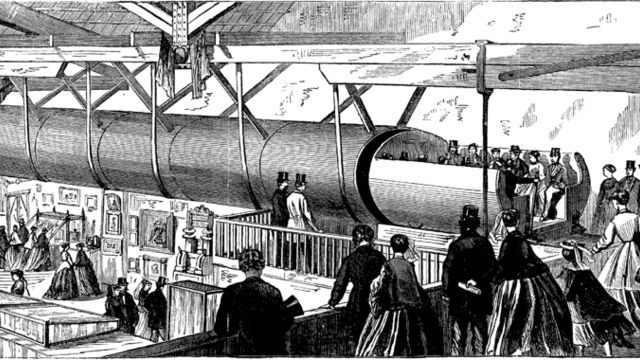The Dust Bowl of the 1930s was situated in the American prairies, but the ramifications of the poor farming methods were wide, and the storms soon swept east and obscured the sun over the entire Atlantic seaboard. I thought of what was known as the “Black Blizzards” because I just read Michael Tennesen’s The Next Species, a very interesting book about the potential end of us. The author draws an analogy between the Depression Era dust storms and what may occur in Las Vegas if the crust of the nearby desert floor dissipates, something that’s possible because of the havoc we’re playing with the environment. The difference between boom town and ghost town can be decided by the tiniest particles. A year after the first wave of the storms in 1934, mayhem was still the order of the day, as this article from the April 15, 1935 Brooklyn Daily Eagle can attest.
Tags: Michael Tennesen
Cliven Bundy, the apotheosis of Tea Party hypocrisy, paranoia and prejudice, is still up to his tits in cattle.
After a mess of militias engaged in a 2014 armed stand-off with federal agents on his behalf over unpaid taxes, Bundy is still in arrears and more emboldened than ever. A year after the Fox News-enabled gun-waving, Rory Carroll of the Guardian caught up with the American who would most resemble a real-life Simpsons character if he was at all funny. He’s feeling triumphant, but the feds are still pursuing the matter with a slower and steadier approach. An excerpt:
Wearing trademark jeans, boots, cowboy hat and bolo tie, the Mormon father of 14 was upbeat in an interview with the Guardian, speaking from the family home – which as a boy he helped his father build – and as he inspected cattle pens, trailed by his two dogs.
“I don’t think this is a battle that Cliven Bundy won. It’s a battle that the American people won. They’re just not going to put up with abuse by the federal government.”
Bundy said he was no outlaw, that he pays all taxes and state duties – but not federal fees for grazing, which he stopped paying after the BLM imposed restrictions as part of an effort to protect the endangered desert tortoise.
The federal government owns 85% of Nevada land, and a federal court upheld the claim against Bundy but he rejected its authority and legitimacy, citing a libertarian theory that the US constitution forbids federal ownership of land. “This is not about Cliven Bundy and cows. It’s about state sovereignty.”
The BLM’s retreat vindicated his stance, he said, tapping a copy of the US constitution which he keeps in a breast pocket.
Third-person grandiosity and race-tinged commentary
Two clouds, however, hover above the rancher’s apparent triumph.
A supporter named Will Michael recently pleaded guilty in a federal court in Pennsylvania to making threats against a BLM official during the standoff, a possible harbinger of prosecutions against other supporters and Bundy himself.•
Tags: Cliven Bundy, Rory Carroll
Google Glass’ douche factor was insurmountable. But what if functions were contained in a tiny contact lens that was undetectable?
One such innovation, which doesn’t have nearly the number of uses of Sergey Brin’s eyewear but does provide telescopic vision, is nearly upon us. From Robert J. Szczerba at Forbes:
For those of us old enough to remember television in the ‘70s the epitome of cool was the Six Million Dollar Man, Col. Steve Austin and his bionic enhancements. But what was once the purview of science fiction is inching closer to becoming an everyday reality, as optics specialist Eric Tremblay unveiled a unique contact lens that provides the user with telescopic vision. The lens was revealed earlier this year at the annual meeting of the American Association for the Advancement of Science (AAAS) in San Jose, California.
The new contact lens, a more advanced model of a prototype introduced in 2013, is 1.55 millimeters thick and features a very thin, reflective telescope, which allows the user to zoom in and out in literally a wink. The telescopic contacts are made with a rigid lens known as a scleral lens— larger in diameter than the more familiar soft contacts, but useful for special cases, such as for people with irregularly shaped corneas. Despite their size and stiffness, scleral lenses are safe and comfortable for special applications, and are an attractive platform for technologies such as optics, sensors, and electronics.•
Tags: Eric Tremblay, Robert J. Szczerba
Salespeople at companies I have worked for: Scientologists, cokeheads, pathological liars, a fuckface who rang a cowbell each time a deal closed, a lady who loudly worried about the state of her “ta-tas” prior to meeting clients, and one guy so creepy I think about him each time I hear of a string of Craigslist hooker murders.
No, they weren’t all that bad, but the goal of having an in-house staff of highly professional salespeople at every single business is likely unrealistic. Could this department be reimagined, perhaps outsourced, even Uberized?
In a Wall Street Journal article, Christopher Mims writes about the growing momentum of sales as a contingent position, a potential further fractionalization of the job pool. The opening:
Right now a college student in Sweden—let’s call him Sven—has a rather unusual summer job. He’s in sales, but he hasn’t met anyone from the company whose products he pushes.
His boss is an app. It considers Sven’s strengths and weaknesses as a salesman, matches him with goods from any of a dozen brands, and plots a route through Stockholm optimized to include as many potential customers as possible in the time allotted to him.
The app is like Uber, but for a sales force. It has many of the same dynamics: Companies can use it to get salespeople on demand, and those salespeople choose when to work and which assignments to accept. The startup behind it, Universal Avenue, calls the idea “sales as a service.”
While the Stockholm-based company may be pioneering this model of it, outsourcing functions traditionally considered integral to a business is a trend that’s gaining steam with certain types of companies.
Anyone who needs to put salespeople in front of potential customers who aren’t otherwise economical to reach can do so, it seems, by combining the magic of a remote workforce and fractional employment.•
Tags: Christopher Mims
Of all the great things robotics have brought to our lives, Der Boxroboter is responsible for none of them. The aforementioned fighting machine was a German-manufactured 1980s sparring partner promised to be an alloy Ali. Watch it jab in the video below at the 20:35 mark. From a 1987 Sports Illustrated piece:
The German Democratic Republic is very advanced in the use of scientific training methods for its athletes. Now the East Germans have beaten the world to the punch in the sport of boxing. Meet Der Boxroboter, a GDR-designed-and-built computerized robot that can hang in there with the best of fighters for hours on end. ”It’s tough to find good sparring partners, especially for heavyweights,” says Dieter Seala of the GDR trade mission, which plans to market DBs internationally for a little more than $33,000 apiece. ”Human sparring partners get tired after a few rounds. They get punched too many times and lose their consistency.”
DB is not just a Rock ‘Em Sock ‘Em robot. It can be programmed to assume any fighting style — attack the upper body, go for the belly, back an opponent into a corner — and is allegedly quicker across the ring than any human boxer. DB is equally adept at throwing rights and lefts and has great wheels (literally).•
When making an accounting of all the great American short-story writers, is Grace Paley the most neglected? Despite just three major collections, she was one of our best–funny, outraged, noble and strange. The author’s time was split among fictional narratives, motherhood and human-rights protesting. In a 1979 People article, Kristin McCurran suggested that perhaps Paley’s literary output had been compromised by time spent on political causes, a trade-off the writer never seemed to regret. An excerpt:
She is an American writer few people have read, but those who have, including her most distinguished peers, think the world of Grace Paley. To Susan Sontag “she is a wonderful writer and a noble citizen.” To Donald Barthelme “Grace Paley is a very good writer and troublemaker.”
Both were by way of explaining why the Sarah Lawrence teacher and short-story writer was in a Washington, D.C. courtroom last week. Her troublemaking had consisted of stepping onto the White House lawn last Labor Day with 10 other members of the War Resisters League and unfurling a banner which read NO NUCLEAR WEAPONS, NO NUCLEAR POWER—U.S. OR USSR. As Grace told superior court Judge Donald S. Smith at her sentencing, “We tried to go about the demonstration in a quiet, gentle way.” The judge’s response: a suspended 180-day sentence, $100 fine and three years’ probation.
At the time of the White House protest, seven fellow War Resisters, on U.S. tourist visas in Moscow, had staged a similar demonstration outside the Kremlin. But while the Washington 11 were being jailed for 30 hours and tried by jury last December, their compatriots in Moscow were released without arrest. Paley’s group did not hesitate to publicize the irony.
Of course her activism has slowed her already painstaking creation. Grace, at 56, has published only two major collections of stories and none since Enormous Changes at the Last Minute in 1974. Indeed, she has been busily seeking confrontations with authorities since the ’60s, when Vietnam war protests took her to Hanoi, Stockholm and Paris. “I think I could have done more for peace,” she admits, “if I’d written about the war, but I happen to love being in the streets.”
Even literary admirers who share her politics probably half wish Paley would chain herself to the typewriter instead. Her characters, as one fond critic described them, are “lonely people, junkies, unwed mothers, losers of all sorts, and the lady downstairs, who is often drunk.” Philip Roth calls her work “splendidly comic and unladylike.” But Paley intends to go on being unladylike, as it were. “I believe that people have to act,” she says. “Billions of dollars are put into what’s called defense, while the needs of the people are neglected.”•
Tags: Grace Paley, Kristin McCurran
The popularity of dystopic culture, I believe, is far more complicated than a fear of the world ending. We’re not really worried about things falling apart but that they might not.
Part of the allure of apocalypse entertainments is that we get to, if briefly and virtually, quiet the hum of progress, the noise of the new technologies. There’s a deeply buried anxiety within us that the world will continue apace–perhaps at an accelerated pace–leaving most of us in its wake. The death of development on screens and in pages is a relief of sorts, something we crave, not dread.
In his latest Medium piece, “Optimism Doesn’t Sell,” Jeff Jarvis, who sees the Google Glass as half full, writes about the box-office failing of Disney’s future-positive Tomorrowland:
Much of the dystopianism that surrounds us today is about our machines and the companies that run them: how Google makes us stupid, Facebook kills privacy, Google Glass turns us all into peeping Toms, robots will take our jobs and our car keys, the internet of things will open the door to crime, and artificial intelligence will bring unspecified dangers (the juiciest kind).
But the truth is that dystopianism is rarely about technology. It’s about people. The dystopian fears that his fellow man and woman are too stupid to use technology well, too gullible to see its risks, too timid to control its dangers, too venal to see beyond its temptations.
Dystopianism is the ultimate statement of hubris: ‘I am smarter than the rest of you,’ says the profound pessimist. ‘I can see where you are all going wrong. I can see that you can’t learn. I am better than you all.’
Like game shows, reality TV, and gawking at Walmart shoppers, dystopianism is mostly an excuse for making fun of your neighbors and feeling superior to them. They’re so stupid they’re ruining the future.•
Tags: Jeff Jarvis
Tags: Nicholas Georges
Libertarianism is supposed to be having a moment in America, but Edward Luce of the Financial Times argues that it’s Socialism that really is. I’ll certainly disagree with the columnist’s depiction of Martin O’Malley as a “left winger” (he’s a pragmatist in the Clinton mold), but it is worth thinking back on the collapse of the Soviet Union. At that moment, it seemed capitalism had ultimately triumphed. What if capitalism leads to robotics so profound that technological unemployment brings about the end of capitalism? Or at least a radical redefining of it? Not impossible.
Luce’s opening:
Leftwing politicians are in electoral retreat across most of the western world. The one exception is the United States. At 15 per cent in the Democratic polls, Bernie Sanders, the senator from Vermont, is riding higher than any US socialist since Eugene Debs ran for the White House a century ago.
The fact that Mr Sanders has very little chance of unseating Hillary Clinton is beside the point. His popularity is dragging her leftward. If he flames out, other left-wingers, such as Martin O’Malley, the former governor of Maryland who entered the race at the weekend, are ready to pick up the baton. Elizabeth Warren, the populist Massachusetts senator, will continue to prod Mrs Clinton from outside the field. The more Mrs Clinton adopts their language, the harder it will be for her to reclaim the centre ground next year. Yet she is only following the crowd. A surprisingly large chunk of Democrats are happy to break the US taboo against socialism.
To most students of US politics, the phrase American socialism is an oxymoron — like clean coal or the Bolivian navy. A century ago, Werner Sombart, a German scholar, asked “Why is there no socialism in America?” It was a question that confounded Marxists. As the most advanced capitalistic society, the US was most ripe for a proletarian revolution, according to their teleology.
Yet the US refused to live up to its role.•
Tags: Edward Luce
Harvey Pekar was considered a kook because he didn’t see himself as David Letterman’s punchline, but he was right in believing he deserved respect. Not because he was a fascinating writer and thinker, though he was, but just because he was a human being. That was enough.
In 1997, Pekar was asked by the Northern California publication Metroactive to review a posthumous collection by Herbert Huncke, the original Beat, who was even more of an outcast than the American Splendor writer. It was a great pairing since, paraphrasing Nick Tosches, they both realized you could be a loser with a capital “L.” An excerpt:
Though he went on the road at the age of 12, Huncke was a competent technician and lyrical, evocative writer. He was given to making wry observations and registering complaints about his mistreatment by others, but he also took advantage of, and even stole from, his friends.
Often, however, Huncke was quite helpful and sympathetic to others. Benjamin Schafer, the book’s editor, includes in his afterword a touching account of how Huncke aided him during a bleak period in his life. Huncke hated 9-to-5 restraints and sacrificed much to escape them, including, ironically, his freedom, spending a great deal of time in one of the most restricted environments of all: prison.
Few men who engaged in hustling and criminal behavior had his vivid powers of description. Huncke provides colorful, if grim, accounts of Bohemians living on the edge, of the difficulties they face and of their attempts to cope with them.
At times, the grimness turned to genuine despair. Busted just after getting out of jail, Huncke contemplated suicide:
I wanted to kill myself. Thoughts of disgust, anger, frustration, confusion, and a complete physical let-down had me exhausted. At one point, I promised myself I’d do this bit and when I’d get out, I’d disappear down at the Bowery–anywhere–never show my face to my friends again, sort of fade into nothingness.
But Huncke did not give in; maybe the writing kept him from fading away. He even managed to stay more or less within the law in the 1960s and, partly due to his charm as a storyteller, cultivated a following as a writer and “character.” At the end of his life, the Grateful Dead paid his rent at the Chelsea Hotel, and he lectured at colleges. Huncke, one of the fathers of the Beat movement, survived almost all his literary compatriots, living to a ripe old age in the process.•
- Man’s Love For Brother Inspires ‘Fart Symphony’
- Masturbating Can Get Your Hands Pregnant In The Afterlife, Muslim Televangelist Warns
- Teacher Allegedly Shares Nude Photos Of Her Boob Job With Students
- Man Named Bacon Assaults Person For Eating Sausage: Police
- Twins Arrested For Throwing Bricks At Each Other
- Man Asks City To Ban Fart Smells — For A Good Reason
- Danish Radio Station Beats Rabbit To Death Live On Air
- The Very Public Spaces Where People Privately Orgasm
- Eric Stonestreet Apologizes To Jim Parsons For Sex Toy Mishap
- Why We’re So Excited About Granny Panties
Kris Jenner is the new Joe Jackson, and a big ass the new moonwalk.
We don’t have to like what the Kardashian-Jenner clan tells us about our era, but to deny their significance in it–what exactly do those people do?–is to miss the point. From Reality TV to Netflix algorithmic ratings to likes and retweets, the fans, those barbarians, have stormed the gates, overturning the professional class.
Bill Simmons was part of that revolution, bringing a spectator’s passion (along with writing chops and a funny, if sometimes sexist, sense of humor) to a field that had long been called the “sports pages.” The Internet was his playing field and it graduated him from Boston cheap seats to Los Angeles courtside, a progression that never completely sat right.
Now that his run at ESPN has finished ingloriously, here are two passages from Jonathan Mahler’s prescient 2011 New York Times Magazine piece, “Can Bill Simmons Win the Big One?” The first focuses on the rise of the fan and the other on the likely bitter ending of a stormy if mutually profitable relationship.
__________________________
A brief, reductive history of modern sportswriting in America might look something like this: Practitioners of the craft during the first two-thirds of the 20th century paid for their unfettered access to athletes by glorifying them, “Godding up those ballplayers,” as one sportswriter memorably put it. In the 1970s, sportswriters stopped protecting athletes and started demythologizing them. As they did, their access diminished. The gulf between ballplayers and fans widened.
Enter Simmons and his legion of imitators, whom you won’t find loitering in a locker room, trawling for quotes or sitting at the press tables of an N.B.A. game, where rooting is forbidden. At the center of Simmons’s columns is not the increasingly unknowable athlete but the experience of the fan. His frame of reference is himself. He might not be able to tell you how a ballplayer felt performing a particular feat, but he can tell you how he felt watching it, what childhood memories it evoked, the scene from the movie “Point Break” it brought to mind, which one of his countless theories — newcomers to his column can consult a glossary on his home page — it vindicates. There’s a vaguely metaphysical quality to this approach: the sportswriter Robert Lipsyte calls it “the tao of Bill.”
Simmons is more than just a fan; he is the fan, the voice of the citizenry of sports nation. In a larger sense, what he’s doing is nothing new. In much the same way that newspaper columnists call out callous politicians and crooked businessmen, Simmons rails against greedy owners, the commissioners who invariably side with them, overpaid players and dysfunctional franchises. Recently, he lambasted the Maloof brothers, the owners of the Sacramento Kings, for neglecting the team, and David Stern, the N.B.A.’s commissioner, for allowing them to do so. “Once you get approved to purchase an N.B.A. franchise, for whatever reason, David Stern seemingly yields all control over your behavior unless you criticize his officials,” Simmons wrote. “Anything else? Knock yourself out. Buying into the N.B.A. is like buying a house: Once you move in, feel free to disgrace the neighborhood however you want.”Simmons is a funny, intelligent and original writer. He comes up with surprising angles and conceits — in a column last month, he applied quotes from “The Wire” to moments in the N.B.A. playoffs — that may not always work but certainly prevent him from becoming predictable. He is especially good at describing sports moments, a dying art since the arrival of nonstop sports highlights.
But Simmons’s rise has been fueled by broader forces too. The recent explosion of the sports industry — the emergence of 24-hour sports networks, sports-radio shows, Web sites, fantasy leagues, video games — has been geared foremost toward creating and satisfying the demands of the consumer. The fan became the engine of the sporting world.
__________________________
It was a sultry afternoon, and midway through the game, we went inside to the Dugout Club to cool off and talk. Simmons sounded as if he was having some regrets about Grantland. “It hasn’t been as much as fun as I had thought,” he told me. “I’m not sure I would do it again.” Too much of his time was being spent in the office, dealing with administrative tasks, which was encroaching on his column.
Simmons’s literary persona suggests a slacker, a guy who would like nothing more than to spend his days drinking beer and watching sports. This image, enhanced by his loose, casual prose, is misleading. The real Simmons is hard-working and competitive. His rise to prominence has been punctuated by bouts of restlessness and frustration, even when things looked from the outside to be going his way. He’s still chafing over his publisher’s handling of his 2009 book, The Book of Basketball, a No. 1 New York Times best seller.
As far as Simmons has come since he first started searching for an audience, he wants to go much further, to create something more enduring than his column or even his books. But the drudgery of running his own publication is already intruding on the utopian world he has built for himself. And he knows that the only thing preventing him from becoming another overexposed hack, an ex-sportswriter who now gets paid to blather on TV, is his column, which can take days to research and write. “My biggest concern about the site is that I don’t want the column to just be one of the things I’m doing,” Simmons said.
After the game, we drove to Chinatown for a late lunch. “Listen to this,” Simmons said, reading the fortune from his cookie as we were getting up to leave: “An important business venture may soon develop for you.” Everyone laughed. “Or it could be the end of my career,” Simmons joked. “I don’t know, I think I have one more big sellout contract in me.”•
Tags: Bill Simmons, Jonathan Mahler
10 search-engine keyphrases bringing traffic to Afflictor this week:
- article about ghost brands being revived
- jean harris in the courtroom
- review of joan didion’s slouching toward bethlehem
- predictions about california earthquakes
- john delorean as a young auto executive
- dolphin injected with lsd
- rev. billy graham’s success
- man with broken neck freak show
- william f buckley running for nyc mayor
- automated office from fascist italy
- Old Print Article: A Coney Island funeral service is performed by phonograph (1895).
- Featured Video: Bobby Fischer plays chess with Bob Hope (1972).
- Recently Posted on NYC’s Craigslist: It’s like Tinder with Lyme disease + I would like to be less of an idiot.
- In 1952, Wernher von Braun wanted to create a gas chamber in space.
- Robert Bigelow wants to develop real estate in space.
- Neil deGrasse Tyson suggests, cheekily, a militarized space race.
- Like any pioneer, Sally Ride was asked a lot of dumb questions.
- Hive consciousness would solve many problems, create others.
- A thumbnail explanation of Yuval Noah Harari’s feelings about cyborgism.
- Douglas Coupland thinks about the so-called Shareconomy.
- Christopher Mims speaks truths about the Shareconomy.
- You can now rent your car, Airbnb-style, by the hour.
- Developers of the Hyperloop aim to make the service free.
- Modern China’s health-care system is frighteningly porous.
- Computer-enabled immortality would complicate the justice system.
- Paul Krugman wonders if new technologies are more fun than fundamental.
- CERN scientists conducted an AMA about the Large Hadron Collider.
- A rebuttal to those who doubt technological unemployment will occur.
- Perhaps technological unemployment will ultimately lead to contentment.
- Neal Stephenson reveals the existential threats he most fears.
- Sylvia Nasar recalls the third act of mathematician John Nash’s life.
- Michael Lewis writes of behavioral economist Richard Thaler.
- Some believe that local bookstores should be subsidized.
- Silicon Valley engineers are drinking Soylent and Schmilk to save time.
- Prices of in vitro hamburgers have fallen precipitously.
- The compact disc was, if briefly, audio’s dominant medium.
- Like many global cities, Chicago is removed from its roots.
- Mary Ellen Mark brought her camera inside brothels, hospices and squats.
- Freeman Dyson writes about Hubble Telescope photography.
- A brief note from 1929 about a wealthy monkey.
- A brief note from 1895 about an embalmer.
- A brief note from 1930 about a brother’s keeper.
- This week’s Afflictor keyphrase searches.
When Thomas Friedman devised his Golden Arches Theory of war, he somehow forgot that humans aren’t rational creatures. Our decisions are often perplexing, and the few among us who make sober, clear-headed calculations are frequently viewed as something other than human. What’s wrong with them?
In a Bloomberg View piece about Richard Thaler’s professional memoir, Misbehaving, Michael Lewis writes of an economist who had a simple-yet-significant epiphany: We make screwy choices, often to our own detriment.
An excerpt:
At any rate, in addition to calculating the market’s price for a human life, Thaler got distracted by how much fun he might have if he asked actual human beings how much they needed to be paid to run the risk of dying. He began with his own students, telling them to imagine that by attending his lecture, they had exposed themselves to a rare fatal disease. There was a 1 in 1,000 chance they had caught it. There was a single dose of the antidote: How much would they be willing to pay for it?
Then he asked them the same question, in a different way: How much would they demand to be paid to attend a lecture in which there is a 1 in 1,000 chance of contracting a rare fatal disease, for which there was no antidote?
The questions were practically identical, but the answers people gave to them were — and are — wildly different. People would say they would pay two grand for the antidote, for instance, but would need to be paid half a million dollars to expose themselves to the virus. “Economic theory is not alone in saying that the answers should be identical,” writes Thaler. “Logical consistency demands it. … To an economist, these findings are somewhere between puzzling and preposterous. I showed them to (his thesis adviser) and he told me to stop wasting my time and get back to work on my thesis.”
Instead, Thaler began to keep a list of things that people did that made a mockery of economic models of rational choice. There was the guy who planned to go to the football game, changed his mind when he saw it was snowing, and then, when he realized he had already bought the ticket, changed his mind again. There was the other guy who refused to pay $10 to have someone mow his lawn but wouldn’t accept $20 to mow his neighbor’s. There was the woman who drove 10 minutes to a store in order to save $10 on a $45 clock radio but wouldn’t drive the same amount of time to save $10 on a $495 television. There were the people Thaler invited over to dinner, to whom he offered, before dinner, a giant bowl of nuts. They ate so many nuts they had no appetite for the far more appealing meal. The next time they came to dinner Thaler didn’t offer nuts — and his guests were happier.•
Tags: Michael Lewis, Richard Thaler
It’s a shame Freeman Dyson has gotten into a spitting match with people perplexed with his views on climate change (I’ve sometimes been one of them), and made intemperate comments on the topic, because having read his work extensively, it certainly seems he cares deeply about conservation and biodiversity. It’s just one of the stranger aspects of a distinguished scientific and writing career.
On another topic: Here’s the opening of Dyson’s latest NYRB piece, a brief essay about the new Taschen book, Expanding Universe, a spectacular collection of photography enabled by the Hubble Telescope, in which the writer marvels over how tiny particles can be more overwhelming than fully-formed bodies:
When we see things for the first time, the pictures are always a surprise. Nature’s imagination is richer than ours. We imagine things to be simple and Nature makes them complicated. In Expanding Universe, a magnificent selection of pictures taken by cameras on the Hubble Space Telescope, the big surprise is dust. We imagined a universe of stars and galaxies gleaming brightly against a black sky. What we see is multicolored patterns of fluid motion, looking like eddies in a river or clouds in a sunset. The patterns are made of dust. Dust is made of tiny solid grains of carbon and rock and metals. The grains condense out of cooling interstellar gas, just as grains of smoke condense out of cooling flames over a forest fire. Most of what we see in the universe is dust. The reason is simple. We see only the surfaces of things, so that things appear big in our pictures when they have a big surface area. Dust has far more surface area than stars or planets. That is why the most striking pictures in this book are pictures of dust. It is not accidental that the editors chose to print on the jacket a spectacular picture of a huge dustcloud giving birth to newborn stars in the constellation Carina.•
Tags: Freeman Dyson
Rome wasn’t built in a day, but modern China almost has been. In a rush to modernization, the focus has been on the greater good, which, as always, has its blind spots, from the world’s highest cancer rates to life-threatening pollution to a healthcare system incapable of nurturing a gigantic population being pulled at a breakneck pace by the sweep of history.
Case in point: The harrowing story of Zheng Yanliang, who took desperate measures to escape certain death in the world’s largest economy.
From Bernhard Zand at Spiegel:
His shroud had already been purchased when, on April 14, 2012, Zheng Yanliang, 48, a Chinese man from Hebei Province, summoned up the last of his strength to lean out of his bed and reach for his toolbox. He took out a hacksaw. Then he wrapped the handle of a backscratcher in a piece of material, which he stuck in his mouth so that he could bite on it. He did not hesitate. He had thought about his options and concluded that he had only one choice, this unthinkable, monstrous deed. He placed the saw against his right leg, a hand’s breadth below his hip, and began to saw.
The life of worker Zheng Yanliang, which began in 1966, probably would have ended in 2012 were it not for a miracle. It’s a life that spans the entire period of China’s opening to the world, and of the great Chinese economic miracle. Zheng diligently contributed to his society’s high-speed transformation, as both a farmer and a migrant worker, as did millions upon millions of his fellow Chinese, in a country where progress for the masses is everything and the fate of the individual means nothing. Zheng’s story shows what can happen when someone falters in this relentless pursuit of prosperity, and when he falls and is taken out of the running. We are only aware of his story because he did something unimaginable to survive, and because photos were later taken of what happened to him. We know nothing about many thousands of other Chinese who fall by the wayside while working to increase their own and the overall gross national product.•
Tags: Bernhard Zand, Zheng Yanliang
In a fascinating New York Times article, Liz Alderman reports on the ghost companies of Europe, phantom businesses with pretend inventory and customers, which exist merely to supply (unpaid) make-believe jobs to the long-term unemployed, novice workers who need experience or those retraining for new industries.
Considered broadly, such an arrangement already exists all over the globe, although not with the express mission of helping citizens back into the workforce. A massive number of people already have fake, non-paying jobs in the Freeconomy. Each day, hundreds of millions create content for Facebook, which would make the company the largest sweatshop in world history, if it paid even a nominal amount. Should technological unemployment become widespread, become the new normal, we’ll continue to produce content and products, even if there’s no compensation. Maybe we’ll receive “free” minutes or bonus points or nothing at all. But for that to happen in a large-scale and permanent way, we’ll have to start taxing capital rather than labor, and there will need to be a guaranteed basic income.
The opening of Alderman’s piece:
At 9:30 a.m. on a sunny weekday, the phones at Candelia, a purveyor of sleek office furniture in Lille, France, rang steadily with orders from customers across the country and from Switzerland and Germany. A photocopier clacked rhythmically while more than a dozen workers processed sales, dealt with suppliers and arranged for desks and chairs to be shipped.
Sabine de Buyzer, working in the accounting department, leaned into her computer and scanned a row of numbers. Candelia was doing well. Its revenue that week was outpacing expenses, even counting taxes and salaries. “We have to be profitable,” Ms. de Buyzer said. “Everyone’s working all out to make sure we succeed.”
This was a sentiment any boss would like to hear, but in this case the entire business is fake. So are Candelia’s customers and suppliers, from the companies ordering the furniture to the trucking operators that make deliveries. Even the bank where Candelia gets its loans is not real.
More than 100 Potemkin companies like Candelia are operating today in France, and there are thousands more across Europe. In Seine-St.-Denis, outside Paris, a pet business called Animal Kingdom sells products like dog food and frogs. ArtLim, a company in Limoges, peddles fine porcelain. Prestige Cosmetique in Orleans deals in perfumes. All these companies’ wares are imaginary.
These companies are all part of an elaborate training network that effectively operates as a parallel economic universe.•
Tags: Liz Alderman
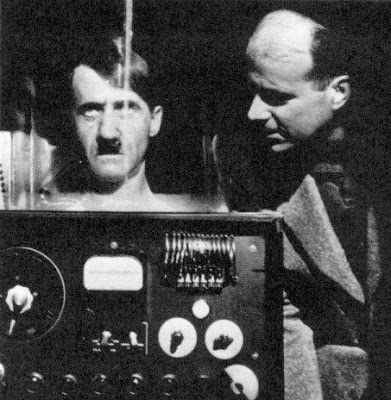
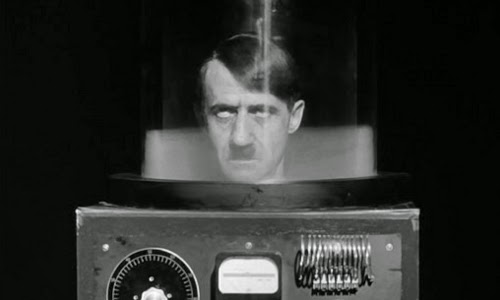 It’s not exactly the most pressing concern to sort out how we’d conduct justice should it become possible for humans to upload consciousness to computers and attain a sort-of immortality for our sort-of selves. But it may be theoretically possible and makes for a fun bull session, so Conor Friedersdorf penned a well-written cautionary essay on the topic for the Atlantic, which also considers other unintended consequences of the endless summer. An excerpt:
It’s not exactly the most pressing concern to sort out how we’d conduct justice should it become possible for humans to upload consciousness to computers and attain a sort-of immortality for our sort-of selves. But it may be theoretically possible and makes for a fun bull session, so Conor Friedersdorf penned a well-written cautionary essay on the topic for the Atlantic, which also considers other unintended consequences of the endless summer. An excerpt:
Radical life extension would so scramble and confound our normal notions of justice that there’s no telling how future Americans would react to the new reality. Historic monsters might be punished for 6 million years … or just three or four times longer than a 150-year sentence a U.S. court imposed on this obscure money-launderer. It’s hard to speculate even when confining ourselves to descendants of ours, in this country, with moral codes closely resembling our own.
In fact, it isn’t clear how we’d react right now.
If today’s Americans magically took custody of servers containing the disembodied consciousnesses of every figure ever mentioned in the country’s newspapers, going back to the beginning, would we stop at punishing former Nazi leaders? Would there be a protest movement to hold Native American killers and slaveholders accountable? What about the folks behind the Tuskegee syphilis experiment? Or the city leaders of towns in the Jim Crow South that subjugated blacks?•
Tags: Conor Friedersdorf
Check me for ticks? (Brooklyn Heights)
I’ve thought about this and it’s not as weird as it sounds. I go upstate most weekends and the tick population has been huge. Last week I found 3 ticks on my body. I don’t have anyone I feel comfortable asking to check me thoroughly so what is a person to do? My eyesight isn’t the greatest and I’m somewhat hairy, complicating the task from my own perspective.
Perhaps there is someone in a medically related field, or studying, who is not especially squeamish about doing examinations involving nudity? Or just open to it? It doesn’t have to be a big deal, but it does have to be done seriously. A careful full body check and removal of any ticks that are found. I have gloves and a little removal tool. It’s important to find attached ticks within 24-48 hours, so this would best take place on Sunday evenings or Mondays, hopefully on a regular basis. I’m located near Borough Hall.
I’m absolutely willing to pay, but as far-fetched as it sounds I’m wondering whether I might find someone in Activities rather than posting this as a job! It’s quite a dilemma, figuring out how to find these little suckers in places you can’t see. Yeah, could try to use a mirror or smartphone, but not ideal.
If someone is in the same predicament I would be willing to reciprocate. Thanks for reading and considering. Oh yeah, I’m a middle aged, healthy, average looking guy.
Of all the poems I read as child, Carl Sandburg’s “Chicago” is the one that stays with me most: “Hog Butcher, Tool Maker, Stacker of Wheat, Player with Railroads.” No place of a complicated nature could ask for a better defense.
Today, Chicago, like most global cities, is more complicated still, a home to stunning wealth inequality, a place of thriving and one of falling, and one connected more to ideas than geography. It’s not just crowded with markets but a market itself.
At the Financial Times, Edward Luce writes of its “two-city tale.” The opening:
They call Chicago the city of big shoulders. Much like Dubai’s emergence from virtually nowhere in the last 20 years to become a global city, Chicago pulled itself up from its bootstraps in the mid-19th century to turn into America’s industrial hub.
Unlike its peers — Detroit, Cleveland and Baltimore — it survived the obliteration of America’s industrial heartlands in the past 40 years by learning to “pour new wine into old bottles,” in the words of Richard Longworth, a leading chronicler of today’s Chicago. Where once it thrived on slaughtered hogs, smelted iron and freight trains, now it hosts corporate headquarters, boasts new economy start-ups and links to other global hubs via O’Hare airport. Today’s Chicago prefers to benchmark itself against Shanghai, São Paulo, Paris — and, yes, Dubai. But is it paying too little heed to what is under its nose?
The fate of a city’s hinterland is one that haunts every great metropolis. For London, it is the rest of the UK which sometimes feels like a different country. For Dubai, it is the Wahhabi heartlands of the Arabian peninsula. For Chicago it is the US Midwest.
In the past, Chicago acted as the locomotive of its hinterlands — in Mr Longworth’s words — buying the Midwest’s farm produce and other raw commodities and then converting them into products. The city was linked umbilically to its surrounding geography and vice versa. Today, it mostly hovers above its hinterlands. But in some ways it is also parasitic on them. Much like the giant sucking sound of London hoovering up the UK’s talent, Chicago takes the best and the brightest from the small towns of America and plugs them into the global economy. Chicago’s success is no longer symbiotic with its rural neighbours. In some ways it comes at their expense.•
Tags: Edward Luce
It’s more than 40 years since research and development began on the Compact Disc, exactly 30 years since the technology’s amazing rise in popularity and more than a decade since the best market the recording industry ever enjoyed started to lose its groove. How did the biggest music companies in the world not see that the information would become pure? It’s the same old story: They didn’t want to accept it would happen because they didn’t want the huge profits to stop coming.
In “How the Compact Disc Lost Its Shine,” Dorian Lynskey of the Guardian has a smart, sprawling article about the brief dominance of a medium. Three excerpts follow.
_________________________
Bootleg CDs were a danger the industry could get its head around – you could hold one in your hand. What it couldn’t comprehend was the threat of the MP3: the idea that music could transcend physical formats. “That happened for two reasons,” says [How Music Got Free author Stephen] Witt. “One was they were enjoying unbelievable profits. Two, the studio engineers hated the way the MP3 sounded and refused to engage with it. A lot of artists hated the way it sounded, too.” What the audiophiles didn’t realise was that most consumers couldn’t tell the difference. “What was the audio experience before the compact disc?” says Witt. “It was cheap vinyl or an AM transistor radio on the beach, and MP3 sounds better than either of those.”
_________________________
Just like their predecessors in Greece in 1982, 90s executives were too busy worrying about the next quarter to consider the next decade. The status quo was perfect, until it wasn’t. “My biggest bugbear about this industry is that they all think short-term,” says Webster. “Nobody ever thinks long-term. All these executives were sitting there being paid huge bonuses on increased profits and they didn’t care. I don’t think anyone saw it coming. I remember the production guy at Virgin saying, ‘In a few years, you’re going to be able to carry all the music you want around on something the size of a credit card.’ And we all laughed. Don’t be ridiculous! How can you do that?”
_________________________
Only a handful of people predicted the CD’s downfall way back in 1982. German computer engineer Dieter Seitzer, the forefather of the MP3, immediately considered the CD “a maximalist repository of irrelevant information, most of which was ignored by the human ear,” writes Witt. If music could become digital data, he thought, it wouldn’t be bound by the Red Book. Webster remembers one industry Cassandra, Maurice Oberstein – who ran CBS and then Polygram in the UK – making a similar point. “He was the only one who went: ‘We’re making a huge mistake. We’re putting studio-quality masters into the hands of people.’ And he was absolutely right in that respect. Once you made a CD with ones and zeroes it was only a matter of time before that was converted into something that was easily transferable.”
The fall of the CD, like its rise, began slowly.•
Tags: Dorian Lynskey, Stephen Witt
The scientists at CERN working on the Large Hadron Collider are asking some scary questions, but it isn’t easy for the layperson to wrap his or her head around the undertaking. In a Reddit Ask Me Anything, in which a multinational group of LHC workers answered questions, a couple of exchanges with nuclear physicist Federico Ronchetti cut through some of the nebulousness.
_________________________
Question:
Explain to me like I am five: why are you doing this and what makes it important? What could we/you do with this data in the future?
Federico Ronchetti:
i can give you an example. in 1800 the study of electricity and magnetism were considered an highly theoretical study with no practical uses. at most was used for circus shows. once understood by means of theory and experiments it shaped the modern world. try to think how could you live without electricity. the research we are carrying out at cern may seem far from everyday life today however will bring forward our knowledge of the natural phenomena and it has already practical spin offs. for instance accelerator technology is used for inoperable cancer surgery and as you may know the software protocol that powers the web was invented at cern.
_________________________
Question:
What are some of the long term practical applications you can envision for this research? Feel free to go wild.
Federico Ronchetti:
you may have heard about project for reaching mars or even for deep space travel. one showstopper there is propulsion. we won’t get very far with chemical thrusters. fully understanding the nature of fundamental forces may pave the way for a new kind of engine that can power deep space exploration. however developing space technologies is not a current research topic at CERN.•
Tags: Federico Ronchetti
The Hyperloop might be built and might be free if it is built. Developers of Elon Musk’s futuristic transportation system are seeking ways to vanish customer costs since it will have to be heavily traveled if it’s to become a large-scale success.
From Katie Collins at Wired UK:
Even though Hyperloop’s pricing consultants estimate a ride will cost twice the price of a plane ticket, [CEO Dirk] Ahlborn is keen to avoid this situation. “We want to make it something you use every single day many times,” he says. He is even debating whether “ticketing is best way of monetising, or are there other ways to make money?”.
“I really, strongly believe that if we create a hyperloop network and it’s free — in the off-peak times at least, in peak times we would charge a little bit — but we make money in other ways, that will really change how people live.”
There are already some options for this; for a start, the system works on 100 percent renewable energy, and actually will make more energy than it needs. As such, says Ahlborn, “we will actually be able to sell the energy.” He’s also looking for ideas for alternative ways in which the Hyperloop might be able to make money.•
Tags: Dirk Ahlborn, Elon Musk






